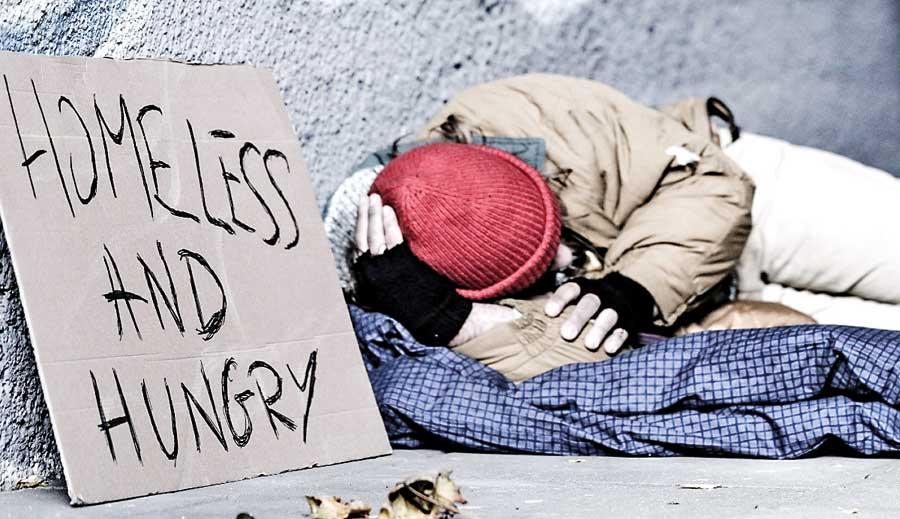19 Mar 2024 - {{hitsCtrl.values.hits}}

This is not the fairy tale land of job agency charlatans. In a revealing Channel 4 interview, a grim picture of working class life in Britain emerges. This isn’t just about poverty. It’s about destitution, the kind of humiliating conditions that Charles Dickens described in his novels back in the 19th century.
When we were in primary school back in the 60s, we were taught a poem about an English boy called Dick Wittington who dreams of distant London with its ‘streets paved in gold.’
English boy called Dick Wittington who dreams of distant London with its ‘streets paved in gold.’
Today’s Dick Wittingtons are in the developing world. They have not heard of that Dickensian era poor boy from rural England but, like this Lankan youth who squandered a fortune for a dream of distant London, they have no idea of the grim realities of life in the United Kingdom today.
His family isn’t wealthy. But, the boy was so captivated by a job agency fairy tale of a good job in England that his mother paid Rs. 3.8 million out of her provident fund money to pay an agency which sold them a fairy tale of ‘a good hotel job, food, accommodation, work permit, everything.”
Today’s Dick Wittingtons are in the developing world. They have not heard of that Dickensian era poor boy from rural England but, like this Lankan youth who squandered a fortune for a dream of distant London, they have no idea of the grim realities of life in the United Kingdom today
When this eager youth arrived in England, he faced a grim reality. Working 12 hour days at a rundown restaurant, he had to cook for 400 people, and didn’t get paid the promised amount. The owner was a nasty Dutchman who beat his workers, desperate people from third world countries, regularly. Unable to stand the exhaustion and bad treatment, this boy quit and returned home, having spent Rs. 3.8 million for a dream job which never existed to begin with.
People have no idea. An associate of mine never tires of telling me that he can get a good job in Western Europe any time he wants. The only thing holding him back is his three-year-old son as his wife works almost twelve hours a day, including commuting time.
Economic troubles
I have told him about Europe’s economic troubles, compounded by war in Ukraine, anti-immigrant bias, rising unemployment and poverty. He’s not convinced. He has not heard of ‘sweat shops’ in Europe, where immigrants from Asia, Africa and Latin America are reduced to virtual slavery. I have stopped trying to advise people. They think you are trying to mislead them out of jealousy, and people squander their precious savings or sell/mortgage properties to get a sweat shop job. Some don’t get even that, getting robbed by bogus job agents.
That Sweden or Switzerland is still economically healthy and doing well doesn’t change this overall picture. The bottom line is that nobody in Europe wants immigrants. Britain’s conservative government had a plan to ship all immigrants to Rwanda last year, but was thwarted by a Supreme Court ruling. It has appealed against it. This is the country to which clueless, desperate young men and women from the developing world dream of escaping to, even if means getting into debt or selling and mortgaging whatever assets they have.
People have no idea. An associate of mine never tires of telling me that he can get a good job in Western Europe any time he wants. The only thing holding him back is his three-year-old son as his wife works almost twelve hours a day, including commuting time
In a revealing Channel 4 interview, a grim picture of working class life in Britain emerges. This isn’t just about poverty. It’s about destitution, the kind of humiliating conditions that Charles Dickens described in his novels back in the 19th century. Decades of prosperity (helped by low inflation and interest rates) followed the post WWII break of the British Empire. But today, the United Kingdom is grappling with impoverishment of its middle class, child poverty, malnutrition, homelessness, unemployment, high inflation and increasing health problems, with long forgotten pre-19th century diseases such as scurvy making a comeback.
Welfare system
Britain’s welfare system, once the pride of the nation, has deteriorated and rights groups call it ‘threadbare.’ Its proud and efficient national health service is overworked and waiting time has doubled over the past five years. Its once prosperous towns such as Blackpool and Ashton are now poverty-stricken. This situation isn’t limited to England. Ireland and Scotland, too, are affected in varying degrees.
Absolute poverty in England is defined at 157 pounds per week, and destitution means less than 95 pounds per week. Inflation and high cost of living are cited as reasons behind increasing destitution, which has doubled in five years.
The British government says it’s doing all it can to keep things under control with its universal credit social security system. Universal credit was introduced by the conservative government of David Cameron to pay for rent, food and other needs. It says it’s helping six million disabled people while fighting inflation, which it sees as the root cause of all these problems.
But critics disagree. Katie Schmucker, policy advisor to the Joseph Roundtree Foundation, says that official claims are ‘disconnected to reality.’ The root cause of poverty, she says, isn’t inflation but ‘our threadbare social security system.’
That Sweden or Switzerland is still economically healthy and doing well doesn’t change this overall picture. The bottom line is that nobody in Europe wants immigrants
That social security needs to be more generous is a controversial political idea that neither of Britain’s main political parties is ready to endorse, but it is very clear that something much more than what is being done now to check poverty and help the needy need to be done.
The existing basic rate for social security/universal credit is 85 pounds per week and this is what Katie Schmucker says is disconnected to reality. People are going to food banks as they don’t have enough for food after paying rent and energy bills. Charities are overwhelmed, and a spokesman for one says that ‘the first thing people ask for is toilet paper.’ Seven in ten destitute people get some kind of social security, but they are still going to food banks for food or going hungry. Like in Sri Lanka, skipping a meal every day has become normal for a lot of people.
Borderland Charity runs one such food bank for refugees and asylum seekers. But this isn’t just about immigrants. The documentary shows the living conditions of Paul, 57, a bus driver out of work because of a medical disability. He gets 843 pounds a month as universal credit, which may sound like a lot, but has to skip a meal every day. Rent has gone up; after paying 620 pounds a month for his small two room flat, (and he must use a launderette for washing clothes) he has 30 pounds left for everything else. With eleven pounds left in his bank account, he is poor, and on the margin of destitution.
He is lucky to still have his flat. Many people unable to afford higher rents have become homeless. High energy bills (80 per cent increases in one year) have left many unable to afford central heating, facing winters of minus 10 Celsius. Even middle class professionals earning between 3000-4000 pounds per month are saving up on home heating.
This is not the fairy tale land of job agency charlatans.
04 Jan 2025 1 hours ago
03 Jan 2025 03 Jan 2025
03 Jan 2025 03 Jan 2025
03 Jan 2025 03 Jan 2025
03 Jan 2025 03 Jan 2025